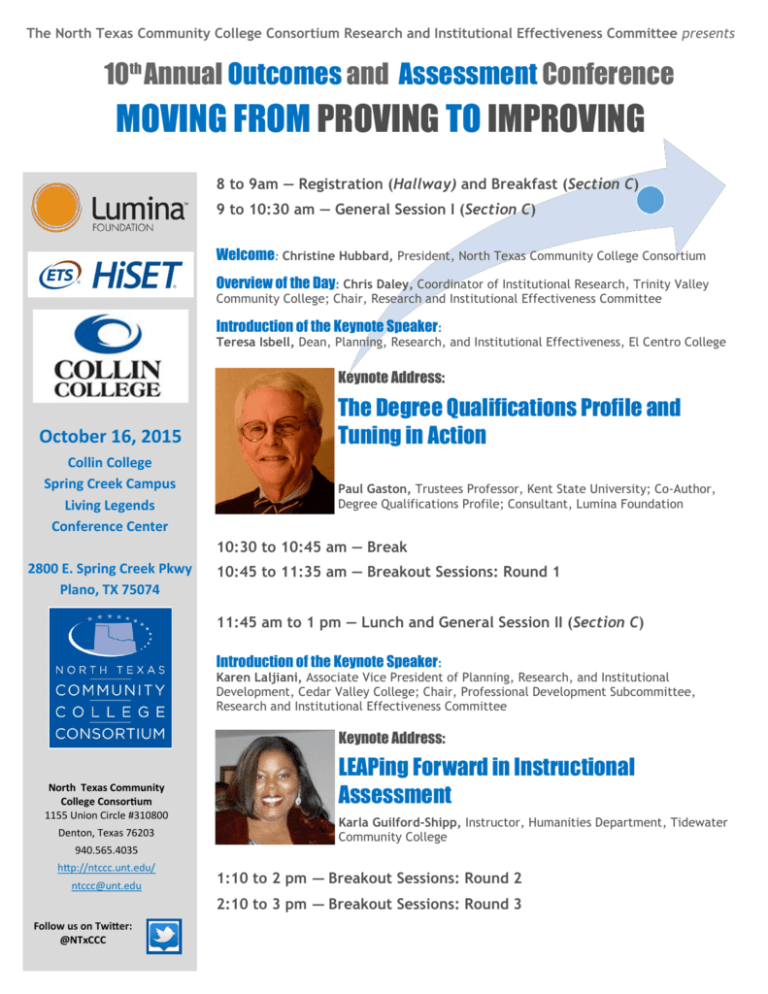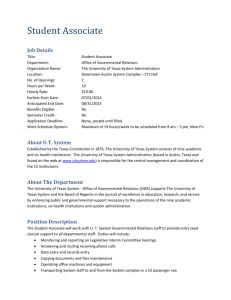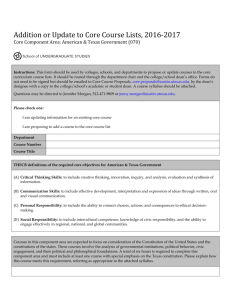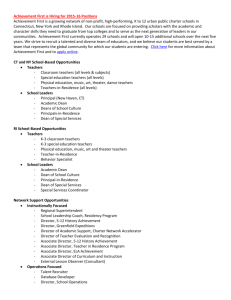moving from provingto improving - North Texas Community College
advertisement

The North Texas Community College Consortium Research and Institutional Effectiveness Committee presents 10th Annual Outcomes and Assessment Conference MOVING FROM PROVING TO IMPROVING 8 to 9am — Registration (Hallway) and Breakfast (Section C) 9 to 10:30 am — General Session I (Section C) Welcome: Christine Hubbard, President, North Texas Community College Consortium Overview of the Day: Chris Daley, Coordinator of Institutional Research, Trinity Valley Community College; Chair, Research and Institutional Effectiveness Committee Introduction of the Keynote Speaker: Teresa Isbell, Dean, Planning, Research, and Institutional Effectiveness, El Centro College Keynote Address: October 16, 2015 Collin College Spring Creek Campus Living Legends Conference Center The Degree Qualifications Profile and Tuning in Action Paul Gaston, Trustees Professor, Kent State University; Co-Author, Degree Qualifications Profile; Consultant, Lumina Foundation 10:30 to 10:45 am — Break 2800 E. Spring Creek Pkwy Plano, TX 75074 10:45 to 11:35 am — Breakout Sessions: Round 1 11:45 am to 1 pm — Lunch and General Session II (Section C) Introduction of the Keynote Speaker: Karen Laljiani, Associate Vice President of Planning, Research, and Institutional Development, Cedar Valley College; Chair, Professional Development Subcommittee, Research and Institutional Effectiveness Committee Keynote Address: North Texas Community College Consortium 1155 Union Circle #310800 Denton, Texas 76203 LEAPing Forward in Instructional Assessment Karla Guilford-Shipp, Instructor, Humanities Department, Tidewater Community College 940.565.4035 http://ntccc.unt.edu/ ntccc@unt.edu 1:10 to 2 pm — Breakout Sessions: Round 2 2:10 to 3 pm — Breakout Sessions: Round 3 Follow us on Twitter: @NTxCCC Conference Speakers Cedar Valley College 10th Annual Outcomes and Assessment Conference MOVING FROM PROVING TO IMPROVING Karen Laljiani, Associate Vice President, Planning, Research, and Institutional Effectiveness Collin College Kathleen Fenton, Associate Dean, Institutional Effectiveness Tom Martin, Associate Vice President, Institutional Research Breakout Sessions: Round 1 — 10:45 to 11:35 am #1—Degree Qualifications Profile and Tuning in Action Keynote Q&A Room: Section C Paul Gaston, Trustees Professor, Kent State University; Co-Author, Degree Qualifications Profile; Consultant, Lumina Foundation Continue the Degree Qualifications Profile and Tuning conversation in this open forum Q&A session. Eastfield College Maria Caratini-Prado, Director of Professional Development Christa Jones, Director of Workforce Education Tricia Thomas-Anderson, Dean of Resource Development El Centro College Teresa Isbell, Dean, Planning Research, and Institutional Effectiveness Kent State University Paul Gaston, Trustees Professor; Consultant, Lumina Foundation North Lake College Yolanda Columbus, Associate Dean Kent Seaver, Director, Learning Resources North Texas Community College Consortium Christine Hubbard, President Richland College Guyla Blaylock, Senior Research Analyst Cameron Maynard, Tutor Coordinator and English Instructor Clive Siegle, Professor, US History Justine White, English Corner Coordinator and English Instructor #2—Speak Up! Oral Histories as the Ultimate Assessment Venue? Room: Section B Clive Siegle, Professor, US History, Richland College Is a picture worth a thousand words? Richland College’s oral history projects deliver them all and more: words, photographs, picture images in the mind’s eye—and a powerful, versatile assessment vehicle with applications across the breadth of the Humanities to boot! #3—Building a Plane in Flight: Piloting Core Assessment at TWU Room: Section D Gray Scott, Assistant Professor and Director of First-Year Composition, Texas Woman’s University; with Terry Senne, Director, Academic Assessment, Texas Woman’s University; and Mark Hammer, Assistant Provost for Institutional Improvement and Data Management, Texas Woman’s University To encourage a campus culture of assessment, Texas Woman’s University recruited volunteers from faculty, staff, alumni, and students (undergraduate and graduate) to rate core artifacts, while framing a Spring 2015 pilot as an assessment-of-the-assessment rather than as assessment-of-students. Drawing on survey and rater data, this talk highlights lessons learned. #4—What Drives Assessment? What’s Best for Students? Can Technology Help? Room: Section E Ronald Carriveau, Assessment and Measurement Specialist, Assistant QEP Director, CLEAR—Center for Learning Enhancement, Assessment, and Redesign, University of North Texas; with Michael Simmons, Senior Associate Director, CLEAR—Center for Learning Enhancement, Assessment, and Redesign, University of North Texas What drives assessment—faculty needs, institutional needs, and student needs? In higher education we are often confused about how to prioritize and meet these needs. By focusing on student needs and using an outcomes-based approach with enabling technology, multiple needs can be addressed. #5—Credit By Exam: Assessment That is Truly Aligned Room: BB 132 Kent Seaver, Director, Learning Resources, North Lake College This presentation will focus on the use of Credit By Exam (CBE) assessments and how they are being successfully used in the K-12, as well as home school, curriculum. A compare and contrast approach will be used to illustrate that CBE’s are successful methods to ensure student and academic success. Tarrant County College Ernie Gines, Assistant Professor of Computer Science, Southeast Campus Texas Woman’s University Mark Hammer, Assistant Provost for Institutional Improvement and Data Management Gray Scott, Assistant Professor and Director of First-Year Composition Terry Senne, Director, Academic Assessment Page 2 Conference Speakers (Continued) 10th Annual Outcomes and Assessment Conference MOVING FROM PROVING TO IMPROVING Tidewater Community College Karla Guilford-Shipp, Instructor, Humanities Department Trinity Valley Community College Chris Daley, Coordinator of Institutional Research University of North Texas Sian Brannon, Assistant Dean for Collection Management, University of North Texas Libraries Ronald Carriveau, Assessment and Measurement Specialist, Assistant QEP Director, CLEAR—Center for Learning Enhancement, Assessment, and Redesign Michael Simmons, Senior Associate Director, CLEAR—Center for Learning Enhancement, Assessment, and Redesign Jason Simon, Associate Vice Provost, Institutional Research and Effectiveness Barbara Stone, Graduate Assistant to the Core Curriculum Jeanne Tunks, Director of the Core Elizabeth Vogt, Director of IE NTCCC Research and Institutional Effectiveness Committee Cedar Valley College Karen Laljiani, Associate Vice President, Planning, Research, and Institutional Effectiveness; Professional Development Chair, Research and Institutional Effectiveness Committee Cisco College Joe Carter, Executive Director, Institutional Research Collin College Kathleen Fenton, Associate Dean, Institutional Effectiveness Tom Martin, Associate Vice President, Institutional Research Breakout Sessions: Round 2—1:10 to 2 pm #6—LEAPing Forward in Instructional Assessment Keynote Q&A Room: Section C Karla Guilford-Shipp, Instructor, Humanities Department, Tidewater Community College Continue the LEAP instructional assessment conversation in this open forum Q&A session. #7—Assessing the Flip Side: Assessing an Academic Skills Center Room: Section A Yolanda Columbus, Associate Dean, North Lake College Some student services such as academic support areas grew organically. They were a direct response to an institution's commitment and students' needs. In today's era of ever-shrinking resources and everincreasing expectations, these units are now expected to report outcomes and demonstrate impact. This session describes how we addressed this challenge. #8—How to Design Effective Assessments for Small Departments Room: Section B Guyla Blaylock, Senior Research Analyst, Richland College Staff in small departments often feel overwhelmed before adding assessment to their duties. This presentation will provide introductory assessment information as well as tips to effectively and efficiently conduct assessments in departments with 1-3 staff members. #9—Moving a Culture of Audit to a Culture of Effectiveness Room: Section D Jason Simon, Associate Vice Provost, Institutional Research and Effectiveness, University of North Texas; with Elizabeth Vogt, Director of IE, University of North Texas IE staff may find their administrative and non-academic departments collect a great deal of audit data and very little data that can be used for effective improvement. This is challenging for staff who may not operate within this paradigm. Learn how IE staff leveraged this challenge and transformed it. #10—Service Unit Assessment and Continuous Improvement Planning: A Step-by-Step Guide Room: Section E Kathleen Fenton, Associate Dean, Institutional Effectiveness, Collin College This presentation can help lead unit administrators and staff out of the maze and mental haze surrounding Assessment and Continuous Improvement Planning for student and business service units with a step-by-step guide and customer satisfaction surveys. The planning/assessment cycle meets units' management needs as well as SACSCOC requirements. #11—What Have Graduates Learned? A Completer Survey for Community Colleges Room: BB 132 Tom Martin, Associate Vice President, Institutional Research, Collin College; with Karen Laljiani, Associate Vice President, Planning, Research, and Institutional Effectiveness, Cedar Valley College There are multiple exit points in education. DQP outlines learning at an Associate's Degree level. THECB learning objectives are for students in the Core. SCANS includes skills and competencies for CTE Certificates. A subcommittee of the North Texas Community College Consortium Research and Institutional Effectiveness Committee incorporated these elements into a graduate survey that's being piloted in some Consortium colleges. Nasreen Ahmed , Assistant Director, Institutional Research Page 3 NTCCC Research and Institutional Effectiveness Committee (Continued) El Centro College Teresa Isbell, Dean, Planning, Research, and Institutional Effectiveness Richland College Bao Huynh, Director, Institutional Effectiveness Rick Leyva, Director, Institutional Research; Immediate Past Chair, Research and Institutional Effectiveness Committee Tarrant County College Marlon Mote, Director, Instructional Assessment; Chair-Elect, Research and Institutional Effectiveness Committee Texas State Technical College-Marshall Afton Barber, Executive Director, Institutional Effectiveness, Research, and Organizational Development Trinity Valley Community College Chris Daley, Coordinator of Institutional Research; Chair, NTCCC Research and Institutional Effectiveness Committee Tina Rummel, Director, Strategic Planning Event Sponsors 10th Annual Outcomes and Assessment Conference MOVING FROM PROVING TO IMPROVING Breakout Sessions: Round 3—2:10 to 3 pm #12—The English Corner: Faculty-Led Tutoring for Increased Passing and Retention Room: Section A Justine White, English Corner Coordinator and English Instructor, Richland College; with Cameron Maynard, Tutor Coordinator and English Instructor, Richland College The English Corner at Richland College is a faculty-led tutoring center initiated to increase retention and passing rates in English. We went from a small voluntary program to fully-supported and departmentalwide. Assessment and data has proven the necessity of it. Our results can be replicated with any department and budget. #13—ITSC 1425 PC Hardware Assessment Models Room: Section B Ernie Gines, Assistant Professor of Computer Science, Tarrant County College Southeast Campus Using one of the Technical Foundation Courses, ITSC 1425 PC Hardware, which is required for all the Associate of Applied Science Technical Programs, an assessment model was created which reflects an increase in student success and retention rate. This assessment model consists of two assessment tools—pre and post-assessment exams and Hardware Troubleshooting Skills Exam—in order to truly prove that student learning is taking place. This is a controlled model designed to compare E-Connect courses with Face2Face courses using the similar structured model. Within this presentation, four semesters will be showcased to illustrate how assessments are used in current settings as tools for improved retention and success. This presentation also shares challenges and recommendations based on the results of the data presented. #14—Texas Core—Commonalities and Unique Characteristics Across Texas Colleges Room: Section D Kathleen Fenton, Associate Dean, Institutional Effectiveness, Collin College This presentation characterizes the commonalities and unique characteristics of the 2014 core curriculum and its assessment as implemented in Texas public institutions of higher education. #15—Blackboard: A Useful Tool for Communal Core Assessment Room: Section E Jeanne Tunks, Director of the Core, University of North Texas; with Barbara Stone, Graduate Assistant to the Core Curriculum, University of North Texas This session will provide participants with a description and demonstration of how Blackboard Learn was used at the University of North Texas to assess the core curriculum during communal scoring process. #16—PLA Portal: Using Technology and Training to Improve PLA Strategies The ETS HiSET® program, a national high school equivalency test, includes elements critical to providing out-of-school youth and adults with the best opportunity to demonstrate their high school-level proficiency and their readiness for higher education or the workplace. Room: BB 132 Tricia Thomas-Anderson, Dean of Resource Development, Eastfield College; with Maria Caratini-Prado, Director of Professional Development, Eastfield College; and Christa Jones, Director of Workforce Education, Eastfield College The PLA Portal Project is a statewide initiative designed to address the need for professional development of higher education personnel in the assessment of prior learning. This session will introduce participants to innovative uses of technology and training opportunities available through the project to create or improve institutions’ PLA processes. Page 4 Event Sponsors Lumina Foundation is an independent, private foundation committed to increasing the proportion of Americans with high-quality degrees, certificates and other credentials to 60 percent by 2025. Lumina’s outcomes-based approach focuses on helping to design and build an accessible, responsive and accountable higher education system while fostering a national sense of urgency for action to achieve Goal 2025. 10th Annual Outcomes and Assessment Conference MOVING FROM PROVING TO IMPROVING Post-Conference Committee Meetings—3 to 4 pm North Texas Community College Consortium Research and Institutional Effectiveness Committee Meeting Room: BB 107 Chris Daley, Coordinator of Institutional Research, Trinity Valley Community College; Chair, Research and Institutional Effectiveness Committee Committee members only. PLA Portal Planning and Implementation Team Meeting Room: BB 132 Tricia Thomas-Anderson, Dean of Resource Development, Eastfield College; PLA Portal Grant Manager Planning and implementation team members only. Breakout Session Overview Section C Round 1 Round 2 Round 3 10:45 to 11:35 am 1:10 to 2 pm 2:10 to 3 pm Degree Qualifications Profile and Tuning in Action Keynote Q&A Section A LEAPing Forward in Instructional Assessment Keynote Q&A Assessing the Flip Side: Assessing an Academic Skills Center The English Corner: Faculty-Led Tutoring for Increased Passing and Retention Section B Speak Up! Oral Histories as How to Design Effective the Ultimate Assessment Assessments for Small Venue? Departments ITSC 1425 PC Hardware Assessment Models Section D Building a Plane in Flight: Moving a Culture of Audit to a Piloting Core Assessment at Culture of Effectiveness TWU Texas Core—Commonalities and Unique Characteristics Across Texas Colleges Section E What Drives Assessment? What’s Best for Students? Can Technology Help? Service Unit Assessment and Continuous Improvement Planning: A Step-by-Step Guide Blackboard: A Useful Tool for Communal Core Assessment BB 132 Credit By Exam: Assessment That is Truly Aligned What Have Graduates Learned? A Completer Survey for Community Colleges PLA Portal: Using Technology and Training to Improve PLA Strategies Page 5







